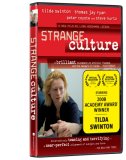| Reviews & Columns |
|
Reviews DVD TV on DVD Blu-ray 4K UHD International DVDs In Theaters Reviews by Studio Video Games Features Collector Series DVDs Easter Egg Database Interviews DVD Talk Radio Feature Articles Columns Anime Talk DVD Savant Horror DVDs The M.O.D. Squad Art House HD Talk Silent DVD
|
DVD Talk Forum |
|
|
| Resources |
|
DVD Price Search Customer Service #'s RCE Info Links |
|
Columns
|
|
|
Strange Culture
Steve Kurtz told the FBI agents what he'd told the local police. He was a Professor of Art at SUNY Buffalo, and that he and Hope were members of a performance art group, the Critical Art Ensemble, which used art and technology to promote political action. The biological materials in the home were all legally purchased on the internet for use in an upcoming art exhibit critical of genetically modified organisms (GMOs) produced by American agrobusiness.
When an autopsy confirmed that Hope died of natural causes, Steve believed that the federal bioterrorism investigation would end. He was mistaken. Instead, federal prosecutions brought charges of mail fraud and wire fraud against Steve Kurtz and the Critical Art Ensemble's science advisor, genetics professor Robert Ferrell alleging that the microbiological agents were fraudulently obtained.
Unlike documentaries that bring attention to some completed case to suggest an unfair outcome (e.g., Thin Blue Line, or Paradise Lost: The Childhood Murders at Robin Hood Hills) or to show a triumph of the little guy against the bullying goliath (e.g., McLibel), Lynn Hershman-Leeson chose to finish Strange Culture while the litigation was still underway. Because of the ongoing case, Steve Kurtz's presence in the documentary, pursuant to advice of counsel, is limited to interviews about events not directly related to Hope's death or events at issue in the litigation. To fill in the rest, Hershman-Leeson relies on news footage and dramatic reenactments.
Thomas Jay Ryan and Tilda Swinton play the roles of Steve and Hope, respectively, in the reenactments. Ryan and Swinton's on camera presence extends beyond the conventional reenactment. They also discuss their characters with Steve Kurtz in a manner reminiscent of Paul Giamatti's interaction with Harvey Pekar in American Spendor (2003). Ryan and Swinton further break down the fourth wall by discussing between themselves their take on the prosecution and other issues of politics, food safety, and life generally.
Hershman-Leeson also documents an art event to raise funds for the Kurtz and Ferrell's defense, and interviews their principal defense attorney. What's lacking is anybody to articulate the Government's case. No federal prosecutors or investigators would speak about the ongoing case, and Hershman-Leeson didn't interview anybody else that would even try to provide an objective analysis of the prosecution's case. In the absence of this, the viewer is left with only the opinion of Kurtz and his sympathizers that the Government is abusing its power to prosecute Kurtz and Ferrell for their politics, and that the purchase of the microbiological agents was done in a lawful manner. As likely as this seems, the lack of unbiased expert legal opinion regarding the applicable law and the relevant facts related to the purchase is disappointing, and leaves the film open to charges of being unbalanced, unfair, and analytically muddled.
The Video:
The 1.78:1 image on this Docurama release is letterboxed. The image, shot on digital video, also suffers from significant aliasing.
The Audio:
The 2.0 stereo audio track is acceptable with no noticeable dropouts or distortions, though there is very little separation between channels except for the score. This release lacks optional subtitles.
The Extras:
The extras include 82 minutes of additional interviews with filmmaker Hershman-Leeson and Steve Kurtz, 7 minutes of outtakes, the original theatrical trailer, a filmmaker's statement and bio, trailers for other Docudrama DVD releases, and most notably a brief "where are they now" update which notes that Ferrell pleaded guilty to a misdemeanor on October 11, 2007, and was scheduled to be sentenced in February of 2008. Although the DVD was not released until March 25, there is no update on Ferrell's sentence, though a bit of internet research reveals that he was fined $500 and given one year of unsupervised probation. It's unclear whether Ferrell will now testify against Kurtz.
Final Thoughts:
Lynn Hershman-Leeson's Strange Culture documents the prosecution of a political art activist who had the double misfortune of suddenly losing his wife and being prosecuted by the United States, likely because of his lawful political activism. Hershman-Leeson does an admirable job of blending interviews, news footage, and dramatic reenactments into an entertaining whole, but the story remains incomplete. The lack of objective analysis of the Government's case, together with the defendants' reticence to discuss the facts of the case, and the lack of even the completion of the trial itself, collectively leave Strange Culture feeling more like a work in progress, than a completed feature documentary. There's little doubt that there's a good story here, and an injustice in the works, but this story needs more time.
Strange Culture will be of interest of fans to unconventional documentaries, but this story needs to play out in the courts before a more definitive story can emerge. Hopefully, Hershman-Leeson will revisit this topic then.
|
| Popular Reviews |
| Sponsored Links |
|
|
| Sponsored Links |
|
|
| Release List | Reviews | Shop | Newsletter | Forum | DVD Giveaways | Blu-Ray | Advertise |
|
Copyright 2024 DVDTalk.com All Rights Reserved. Legal Info, Privacy Policy, Terms of Use,
Manage Preferences,
Your Privacy Choices | |||||||













